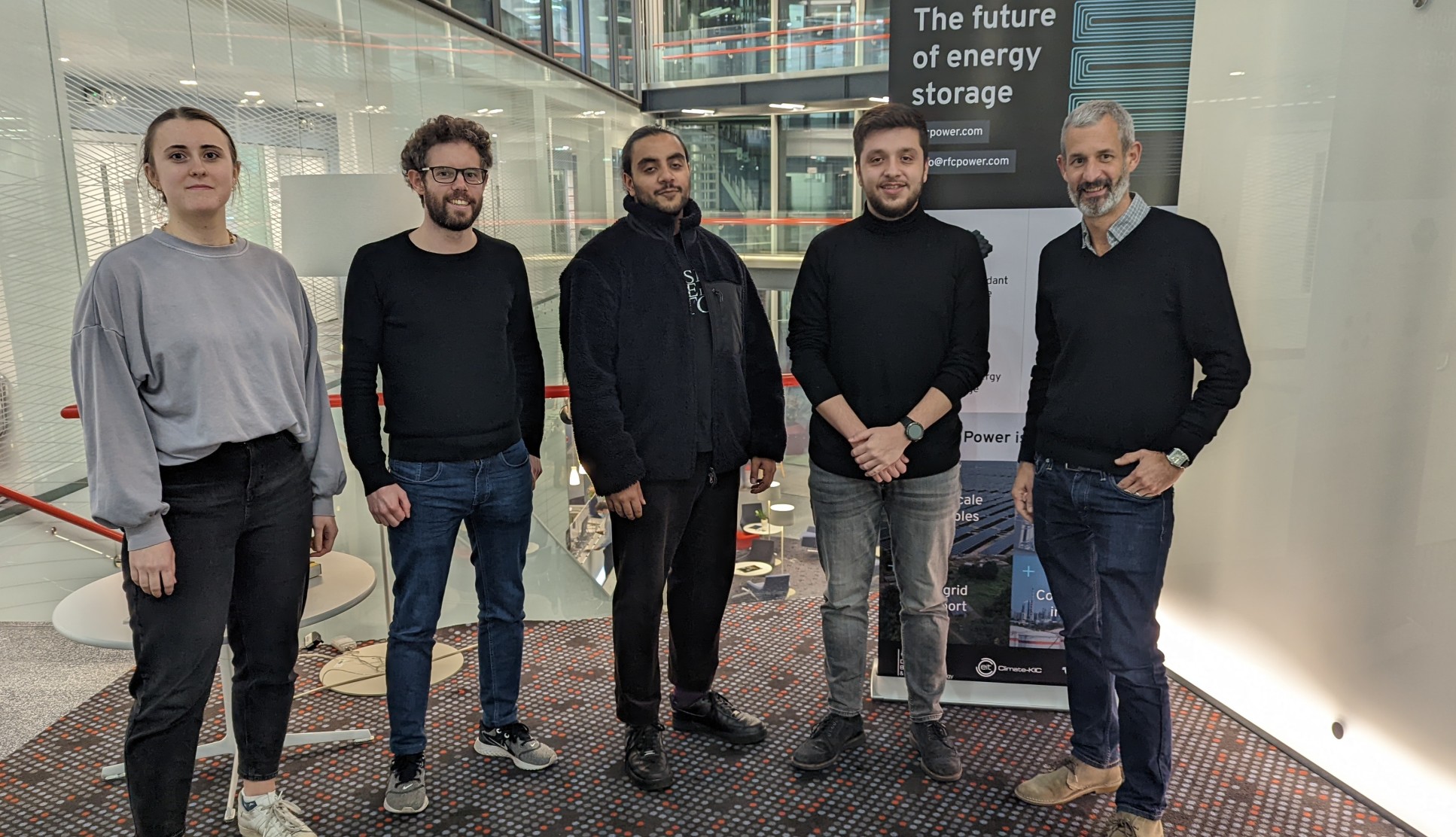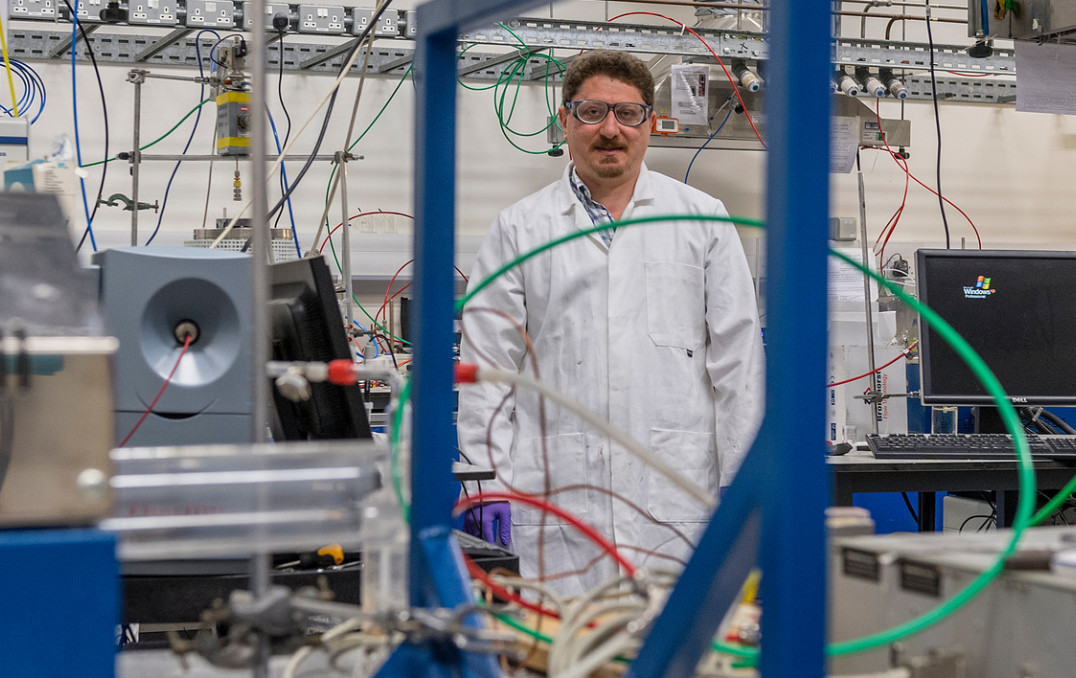Cleantech companies join forces to scale up hydrogen tech for renewable power

Two Imperial cleantech companies have launched a collaboration to support the world’s transition to renewable energy.
Under the strategic collaboration, RFC Power, an Imperial energy storage startup, will have access to engineering and commercial expertise from the UK’s most valuable cleantech company, Ceres Power, itself founded two decades ago using Imperial research.
For the last decade, people have focused on developing renewable power. Everyone knew there was a problem down the road with variability of supply, but didn't want to face up to it. Looking at the economics, long duration storage is a really interesting solution. Dr Mark Selby Ceres
With access to the capabilities of the larger company, RFC Power aims to scale up its long duration storage technology and roll it out to the world.
By storing the electricity generated by renewables for up to 24 hours, RFC Power’s flow batteries could make it possible to power a stable electricity grid solely with renewables and without any fossil power to compensate for daily variations in wind and sun. The company’s hydrogen manganese technology is designed to be cheaper to build and run than existing flow battery technologies, and could therefore help keep the cost of sustainable energy low.
Under the collaboration, Ceres has received an 8.4% stake in RFC Power in exchange for expertise needed to grow the company and its technology. Dr Mark Selby, Chief Innovation Officer of Ceres, will join RFC’s Board and Ceres will lend RFC both its technical expertise in engineering and electrochemistry, and its commercial experience in working with Fortune 500 corporations to produce new devices at scale. The deal also includes an option for the larger company to acquire RFC Power outright.

Scaling up energy storage
The commercial development of long duration storage is seen by some in the energy industry as the next major opportunity to progress the transition to renewable energy systems.
Ceres has kicked the tyres of this technology so we take this as a measure of confidence in our core technology. The task now is to make the devices larger. Professor Nigel Brandon
“The next big thing in the energy transition is going to be long duration storage, without a shadow of a doubt, as people have started to realise how the technology could reduce the cost of the energy transition,” said Dr Selby. “That hasn’t been well understood – for the last decade, people have viewed the challenge primarily as one of getting renewables on stream. Everyone knew there was a problem with variability of supply down the road, but didn’t really want to face up to it. Solutions like nuclear and second-life li ion batteries from cars have been posited, and they solve important problems, but none of them really stack up on the economics of this particular problem, of decarbonising electricity at minimum cost. But if you look at the economics of some long duration technologies, they start to look really interesting.”
RFC Power was co-founded to develop flow battery technology by Professor Nigel Brandon, Dean of Imperial’s Faculty of Engineering, Professor Anthony Kucernak in the Department of Chemistry, and Dr Vladimir Yufit in the Department of Earth Science and Engineering, who are company directors along with Dr Javier Rubio-Garcia. Professor Brandon also has a longstanding relationship with Ceres Power, which he co-founded 20 years ago.
Dr Tim von Werne, CEO of RFC Power, said: “We’re building on ten years of fundamental research that was done in Nigel and Anthony's group, and three years spent as a company validating and improving on that technology. We're now entering the next phase of development where we look to scale the technology. That takes a level of engineering and resource that is difficult to access for an early-stage startup. There’s a good complementary fit between the core chemistry expertise we've developed in our team, and the resource and experience of Ceres Power.”
Professor Brandon said: “Imperial is one of the UK’s centres of excellence for this area of technology and in training up the next generation of scientists and engineers. Despite that, there remains a skill shortage, and tapping into Ceres’s expertise is very valuable for gaining the skills we need at RFC. Ceres has kicked the tyres of this technology so we take this as a measure of confidence in our core technology. The task now is to make the devices larger.”
From fuel cells to storage
The deal has also enabled Ceres Power to add value to its technology portfolio and diversify into a complementary field. The company currently specialises in fuel cells that can use hydrogen produced by renewables to generate electricity without emissions in a variety of settings, including combined heat and power systems linked to homes and commercial premises.
Imperial is adept at recognising the potential of new technology areas, often before the market does, and creating a pipeline of sustainable technology companies that benefit from Imperial’s research and entrepreneurial ecosystem. Dr Simon Hepworth
“RFC has unusually strong intellectual property and it’s extremely timely in terms of where the commerciality of the energy transition is going. Energy storage is the next big transition technology. We’ve been looking at that space for quite a while and recognise that RFC might have an important role to play. This technology, if it works, solves a billion-person problem, and it has a type of IP that can work for Ceres as a licensing business. So it would be crazy not to think about how to accelerate the commerciality,” said Ceres’s Dr Selby.
Phil Caldwell, Chief Executive Officer of Ceres, said: “It is imperative that alongside delivering our fuel cell and hydrogen electrolysis business, we continue to drive innovation to create future value, both through investment in our own technology and partnering in new areas such as energy storage, which are aligned with our purpose.”
Imperial’s startup pipeline
Both companies have made use of research breakthroughs by Imperial. RFC has also benefitted from startup infrastructure established by the College in recent years, including the White City Incubator, which provides a home to early-stage deep science startups, and the Techcelerate programme, which supports researchers to test the market potential of their inventions.
“Ceres and RFC are doing fantastic work using hydrogen to help create the transition in energy systems the world urgently needs,” said Dr Simon Hepworth, Imperial’s Director of Enterprise. “Imperial is adept at recognising the potential of new technology areas, often before the market does, and creating a pipeline of sustainable technology companies that benefit from Imperial’s research and entrepreneurial ecosystem. With this collaboration, they are now working together to multiply this impact and transform an entire sector.”
Imperial last year launched the Transition to Zero Pollution initiative, which is using systems thinking to help bring about a transformation in technology and industrial systems needed to eliminate all forms of pollution. Businesses that wish to access Imperial’s expertise, and Imperial staff and students who would like support with technology commercialisation and entrepreneurship, can access support from the College’s Enterprise Division.
Article text (excluding photos or graphics) © Imperial College London.
Photos and graphics subject to third party copyright used with permission or © Imperial College London.
Reporter
David Silverman
Communications Division


